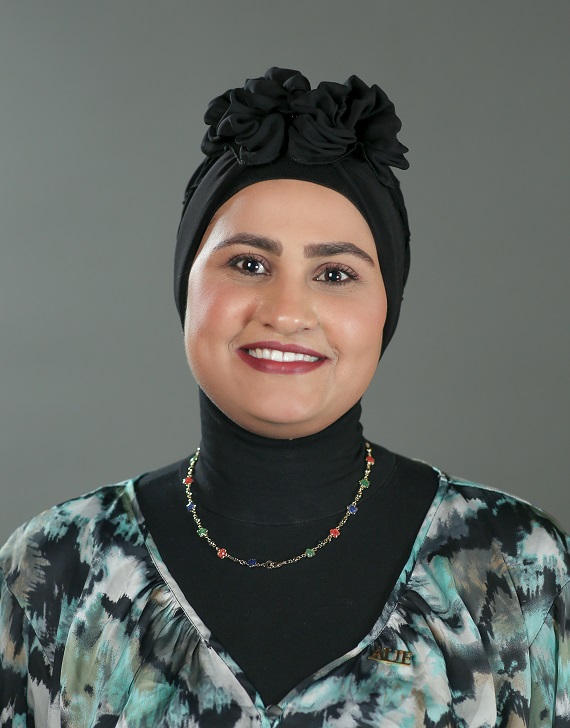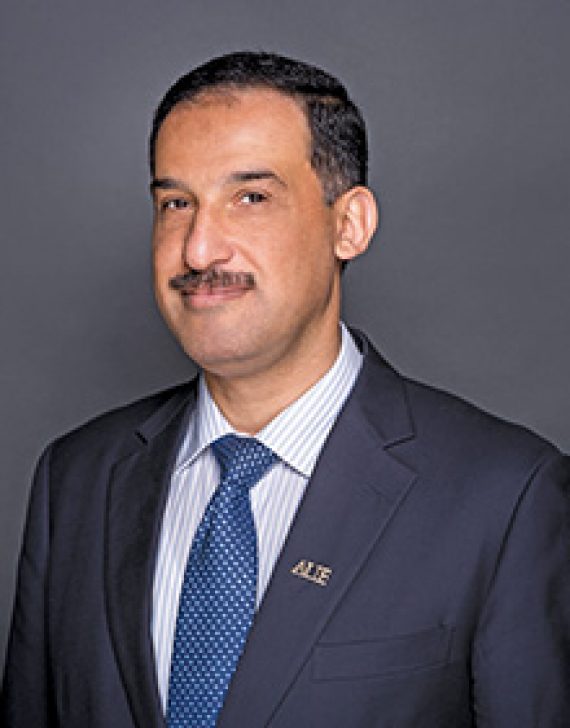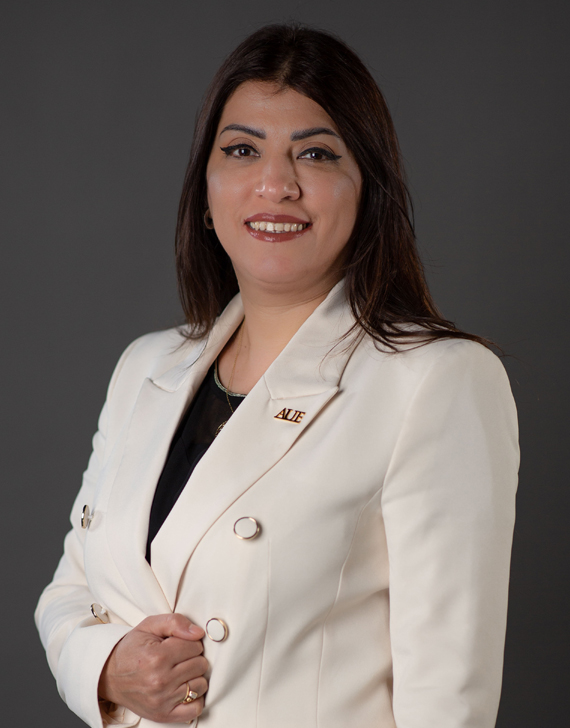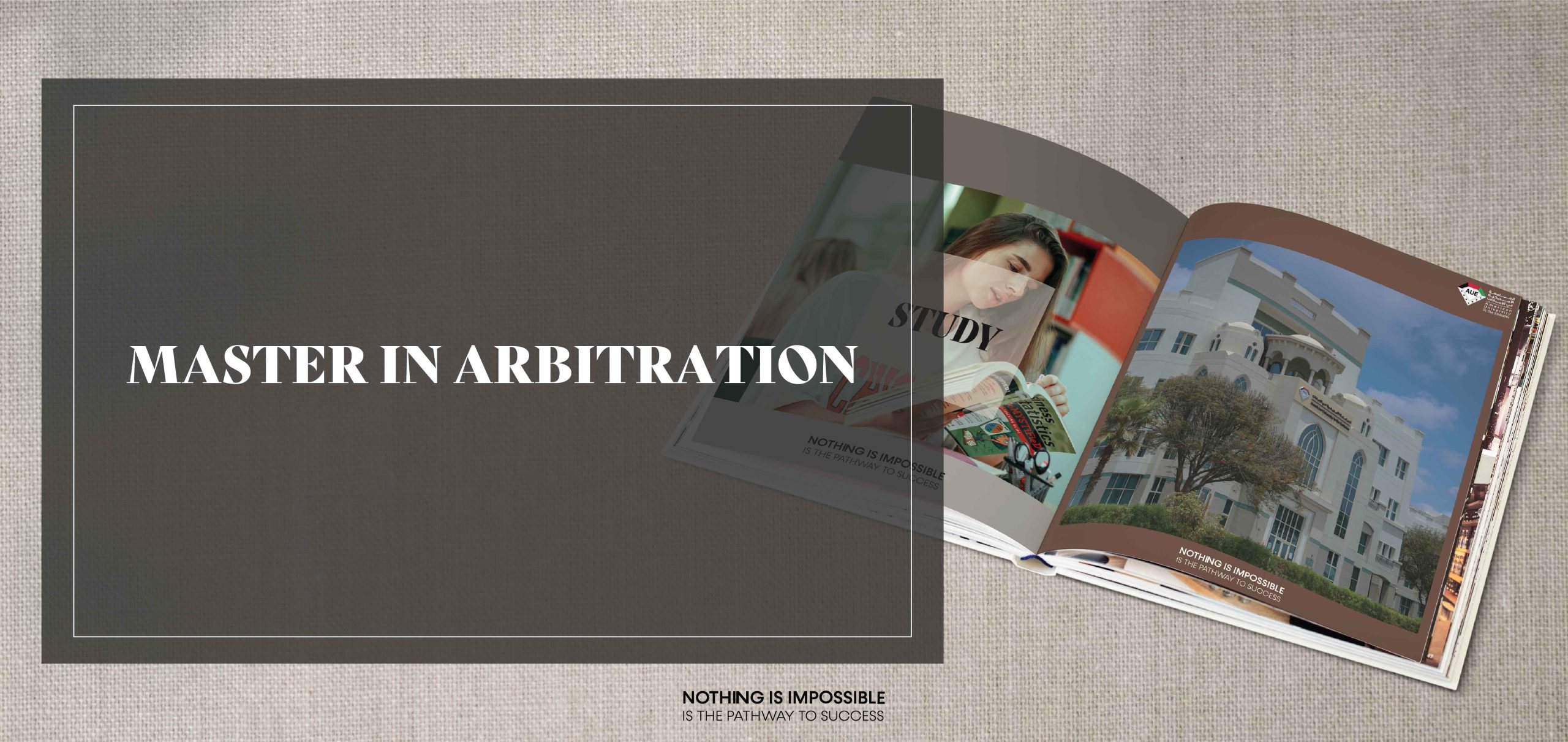
- Overview
- Program Structure
- Accreditations
- Faculty
- Admission
-
Duration
2 Years
-
Classes
Weekday Morning Weekday Evening
-
Fees
Tuition (One Semester) ……… Approx. 42,000 AED
One academic year is two semesters
Admission (One Time) ……… 3,500 AED
About Program
Become a master of conflict resolution with our Master in Arbitration program. Delve into the art of alternative dispute resolution, learning negotiation techniques, mediation skills and arbitration procedures. Develop the expertise to facilitate peaceful resolutions in legal, commercial and international disputes. With this program, you will be well-prepared for a career as an arbitrator, mediator, conflict resolution specialist, or legal consultant. Join us and become a catalyst for harmony, ensuring fair and just resolutions in a rapidly changing world.
Program Goals
- Meeting needs of the local and regional market for experts and specialists in the various fields of Arbitration.
- Developing the scientific research in the field of Arbitration in accordance with the legal rules valid in UAE through supporting the Master’s theses, and emphasizing on comparative analytical studies.
- Establishing a legal center specialized in Gulf legal studies in the field of Arbitration to contribute to preparation of Master’s students in this field.
- Supporting the field of Arbitration and making the academic program as the axis of the Arbitration development in UAE and GCC countries through providing consultations, holding academic and occupational conferences for the stakeholders within the social service framework.
Program Learning Outcomes
- Explain the knowledge related to the Arbitration in a deep and comprehensive way in addition to the relevant knowledge.
- Use the contemporary knowledge of the scientific research so as to become a pillar for constructive critical thinking and familiarity with the recent developments within the arbitration framework, occupational practice, and knowledge production in order to find new concepts and solutions for the new emerging challenges.
- Analyze the relevant issues in light of the scientific reality, to find creative solutions and suggestions related to the academic and occupational fields, and to create new concepts in the arbitration through integrating other cognitive fields.
- Apply the acquired skills in the field of dispute resolution by way of Arbitration, through refining skills that reflect thinking and analyzing capabilities in a high degree of independence.
- Develop the ability to take responsibility and independent performance by making decisions, taking into account the study of professional ethics.
- Creates methods that support to initiate and lead the teamwork.
- Propose new methods for taking appropriate decisions making into account unpredicted data
Program Structure
Course Category
Bridging Courses
Core Courses
Elective Courses
Thesis 1
Thesis 2
Total (Excluding Bridging Courses)
Total Number of Courses
7
6
2
1
1
10
Total Number of Credit Hours
19
18
6
3
6
33 Credit Hours
- Bridging Courses
- Core Courses
- Elective Courses
- Thesis
The Course covers the definition of the Code of Civil Procedure and judicial organization in terms of the constitution of courts, degrees of litigation, judges and their assistants, rules of jurisdiction, case theory, judicial decisions and their types and appeals.
The course aims to provide the students with an in-depth knowledge about the judiciary and arbitration, as well as introducing them to the nature of the relationship between the judiciary and arbitration and the difference between the judiciary as a general mean and arbitration as a parallel mean for settling disputes.
The course also helps the students understand the extent to which the arbitration depends on the judiciary in arbitration agreements, arbitration procedures, implementation of arbitral award, and formation of arbitral tribunal.
The course introduces the students to national and international agreements related to arbitration, including the Geneva Convention on the Execution of Foreign Arbitral Awards, the Washington Convention that led to the establishment of the International Centre for Settlement of Investment Disputes, the Oman Convention on International Commercial Arbitration and the Arab Convention on Commercial Arbitration.
Also, the students will learn about the most important arbitration centers that make decisions on various disputes and their rules, including the Washington Center for Settlement of Investment Disputes, International Chamber of Commerce, the Cairo Regional Centre for International Commercial Arbitration, the Dubai International Arbitration Centre, and the G.C.C Commercial Arbitration Centre
The course introduces the students to the foundations and methods of research and helps them how to choose a topic for research by addressing an existing legal problem and solving it.
Also, the course teaches the students how to develop solutions for legal problems through research and help them understand sources and tools for collecting scientific data, principles of legal writing, how to document the information and attribute it to its source and the rules of comparison between the current legal systems (Islamic law, Latin system and Anglo-American system).
Moreover, the students will learn how to discuss jurisprudential opinions and legal theories and weigh between them, as well as introducing a new opinion that enriches the researcher’s legal library. The course also covers the ethics of scientific research and oral expression skills related to the presentation of the research and its findings.
The student is assigned to prepare a legal research using the approved research methods and then present it to his colleagues.
This course aims to evaluate arbitration and its role in settling disputes arising from stock market transactions and banking operations, and to analyse the position of UAE and comparative legislation, jurisprudence, and the judiciary regarding the application of arbitration rules in disputes arising from stock markets and banking operations.
This course addresses the study of maritime arbitration, the relation between the organization of arbitration in maritime law as well as in general arbitration act, arbitration in maritime transport contracts, arbitration in marine aid, arbitration in sheet losses and maritime collision, in addition to the study of the most important centers in maritime arbitration.
This course includes the study of international judicial jurisdiction, the disputes between States, the peaceful means to settle international disputes, the agreement to arbitrate, the Permanent Court of Arbitration in The Hague, the dispute arbitration procedures, the problem of State immunity and the idea of sovereignty, the structure of the tribunal, the evidence before the international arbitration, the issuance of the arbitration decision and its implementation.
This course includes the arbitration in Intellectual Property Disputes such as Patent, Trademarks, Geographical indications, Industrial Models and Designs, trade secret. Furthermore, this course deals with the relevant legal framework and the confidentiality of the arbitration procedure concerning IP disputes as well as the enforcement of arbitration laws in the field of intellectual property
The Internship course offered by the Master’s Program in Arbitration is an integral part of the program curriculum, as the student is committed to practical training on local and international arbitration cases in order to acquire practical skills that enable the student to deal with the real cases of free and institutional arbitration in the United Arab Emirates.
Recommended Study Plan
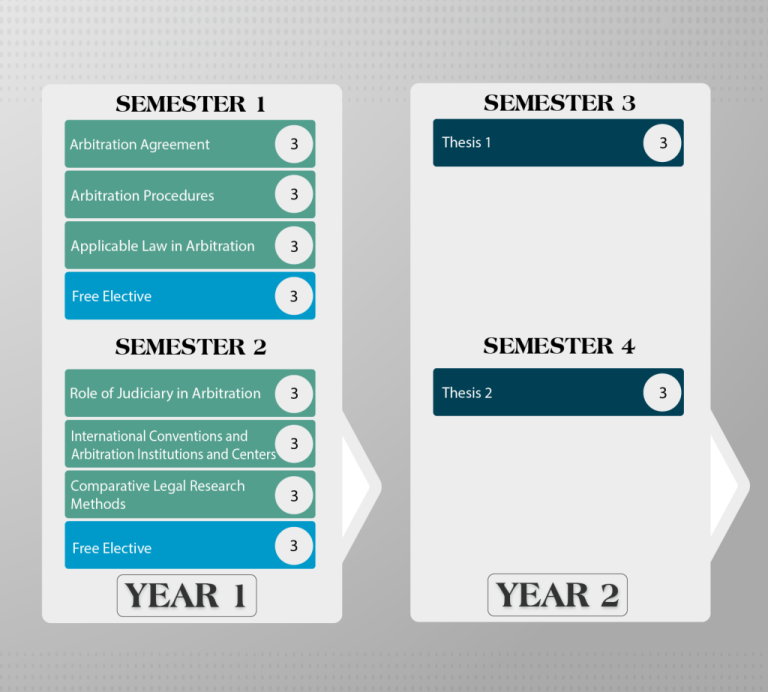
Accreditations
The American University in the Emirates is licensed by the UAE Ministry of Education – Commission for Academic Accreditation | caa.ae
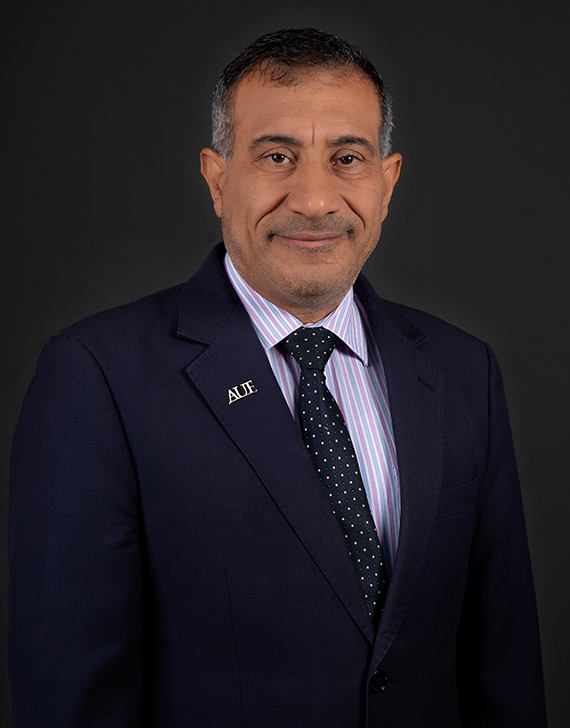
Prof. Raad Adham Al Sammarraie
Professor / Program Director – Masters of Intellectual Property

Dr. Qusay Al Falahi
Associate Professor / Program Director – Master in Arbitration
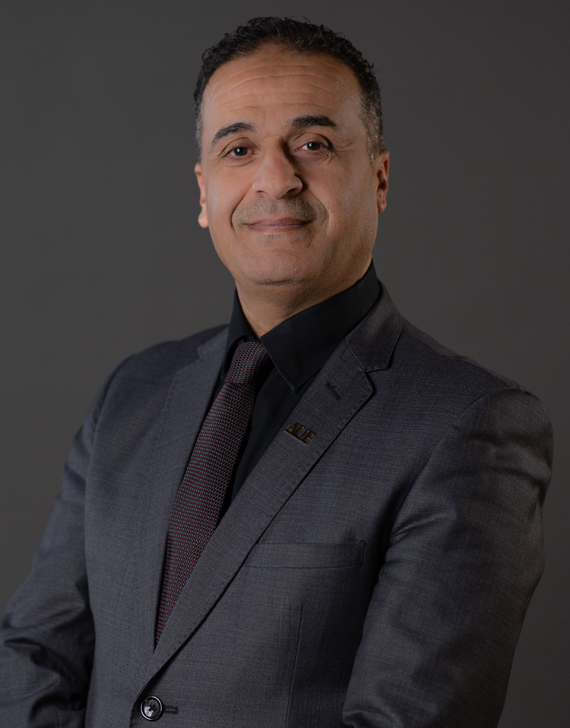
Dr. Ehab Alrousan
Associate Professor / Program Director - Master in Criminal Sciences
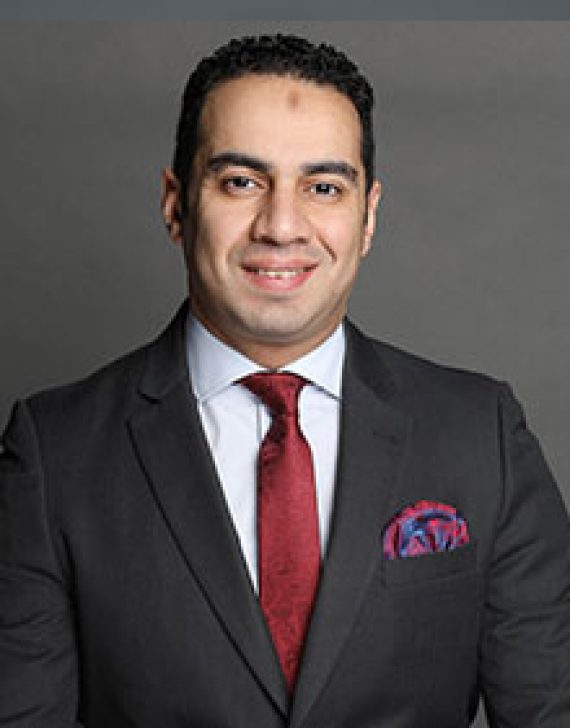
Dr. Ahmed Eldabousi
Associate Professor
Graduation Requirements
For graduate degree completion, graduate students must satisfy the following requirements:
- Earn a minimum CGPA of 2.00 on a scale of 4.00.
- Successfully complete all courses as described in the study plan.
- The Degree Completion requirements must be met within the timeframe of the program.
- Successfully complete the “Thesis” course.
Joining the Program
- Fall Semester
-
September
-
Spring Semester
- January
- Summer Semester
- May
